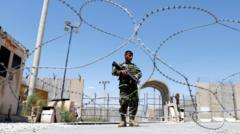Can Trump Really Take Back the Afghan Airbase? Taliban Official Weighs In

Published: 2025-09-19 11:55:17 | Category: world
In recent statements, Taliban official Zakir Jalal firmly dismissed the notion of a US military presence returning to Afghanistan, particularly at the Bagram airbase, which was once the epicentre of NATO operations for two decades. This rejection comes in the wake of former President Donald Trump expressing interest in reclaiming the base, suggesting its strategic importance due to its proximity to China. The diplomatic landscape remains complex, with ongoing US-Taliban discussions, primarily focused on American citizens still in Afghanistan.
Last updated: 14 October 2023 (BST)
Key Takeaways
- Zakir Jalal of the Taliban rejects any US military presence in Afghanistan.
- Former President Trump has hinted at retaking Bagram airbase, citing strategic reasons related to China.
- The US's withdrawal from Afghanistan was codified in a 2020 agreement, completed in 2021.
- There are claims of minimal activity at Bagram since the Taliban regained control.
- China's foreign ministry has reiterated its respect for Afghanistan's sovereignty.
The Context of Bagram Airbase
Bagram airbase has long been a pivotal location for US and NATO forces in the region. It served as a critical logistical hub throughout the two-decade military engagement in Afghanistan. The base was handed over to Afghan forces shortly before the Taliban's return to power in August 2021, marking a significant shift in control and the end of a prolonged military presence.
The US Withdrawal and Its Implications
The complete withdrawal of US troops from Afghanistan was formalised in a deal signed in February 2020, during Trump's presidency. This agreement stipulated a phased withdrawal in exchange for Taliban commitments to prevent terrorist activities. The final troop departure occurred under President Joe Biden in August 2021, culminating in the Taliban's swift takeover of the country.
Trump's Recent Comments on Bagram
During a recent press conference, Trump indicated that reclaiming Bagram airbase could be on the table, asserting that "they need things from us". His statements have raised eyebrows, particularly regarding the base's strategic value in relation to China, which he claimed was just an hour away from where nuclear weapons are produced. However, these assertions have faced scrutiny and clarification, especially as investigations have shown limited activity at the base since the Taliban's resurgence.
The Taliban's Stance
Zakir Jalal's comments directly counter Trump's assertions, emphasising a long-standing Afghan resistance to foreign military presence. He pointed out that any notion of US forces returning was "completely rejected" during the Doha talks, which laid the groundwork for the peace agreement. Jalal's stance is reflective of a broader sentiment among Afghans who have historically resisted external military involvement in their affairs.
China's Role and Response
In light of the discussions surrounding Bagram, China's involvement has also been a subject of speculation. Trump has claimed that China has established a presence at the base, a statement that the Taliban have refuted. A recent investigation into satellite imagery found minimal evidence to support claims of Chinese military activity in the area. A spokesperson for China's foreign ministry reiterated that China respects Afghanistan's sovereignty and stated, "the future of Afghanistan should be in the hands of Afghan people".
Current US-Taliban Relations
Despite tensions, there have been ongoing dialogues between the US and the Taliban. Recent meetings have focused on humanitarian issues, particularly regarding American citizens still in Afghanistan. However, the broader geopolitical implications of Trump's statements and the Taliban's firm rejection of a US military presence suggest a complicated relationship moving forward.
The Importance of Bagram Airbase
Understanding the significance of Bagram airbase goes beyond mere geography. Its strategic location has implications for regional security dynamics, particularly concerning US-China relations. Trump’s focus on Bagram highlights the intersection of military strategy and international diplomacy, even as the Taliban firmly reject any foreign military footprint in Afghanistan.
The Future of Afghanistan
The question of Afghanistan's future remains uncertain amidst these developments. As the Taliban consolidate power, the expectations of international engagement differ significantly from the prior regime. The Taliban's insistence on sovereignty and rejection of foreign military presence must be balanced with the realities of international relationships and geopolitical interests.
What Happens Next?
Looking forward, the situation in Afghanistan will likely continue to evolve. The Taliban's approach to governance, international recognition, and handling relations with major powers like the US and China will shape the country's trajectory. Observers will be keen to see how these dynamics unfold, particularly regarding humanitarian issues and potential foreign investment or assistance.
FAQs
Why did the US withdraw from Afghanistan?
The US withdrawal from Afghanistan was part of a peace agreement signed in 2020 aimed at ending nearly two decades of military involvement. It was designed to facilitate the Taliban's commitment to prevent terrorist activities.
What is the significance of Bagram airbase?
Bagram airbase was a critical logistical hub for US and NATO forces during the Afghan war. Its location offers strategic advantages, particularly in countering regional threats, notably from China.
What has been the Taliban's response to US military presence?
The Taliban has categorically rejected any notion of a US military presence in Afghanistan, emphasising their commitment to sovereignty and independence from foreign military involvement.
What role does China play in Afghanistan?
China has expressed a desire to respect Afghanistan's sovereignty and has indicated that the future of the country should be determined by its people. There are concerns about China's regional ambitions, particularly regarding its Belt and Road Initiative.
Are there any Americans still in Afghanistan?
Yes, reports indicate that there are still Americans in Afghanistan. Recent US-Taliban discussions have focused on addressing this issue and facilitating their safe return.
As Afghanistan navigates these complex geopolitical waters, the implications for regional stability and international relations remain profound. How the Taliban balances their sovereignty with the need for international engagement will be crucial in shaping Afghanistan's future. #Afghanistan #BagramAirbase #USChinaRelations



